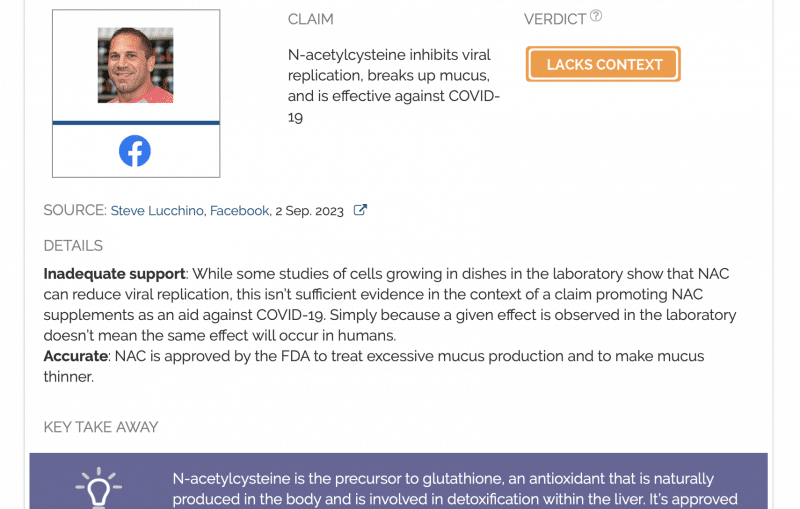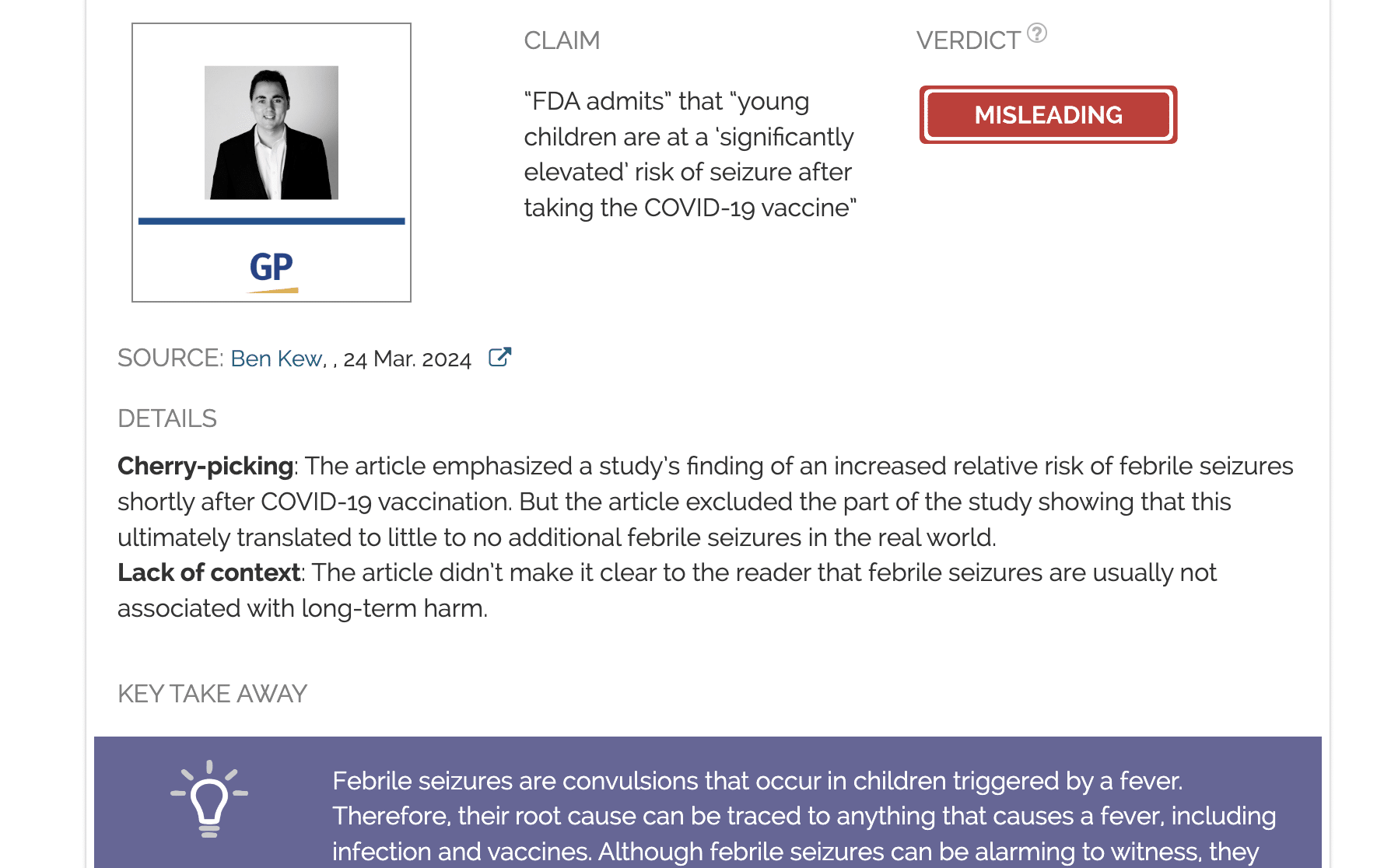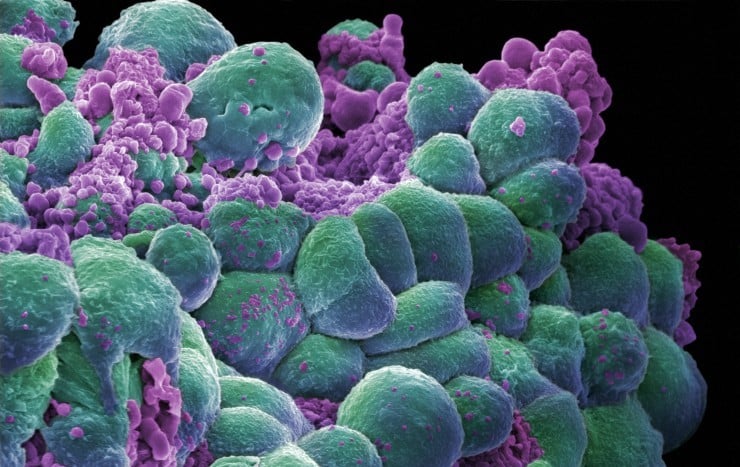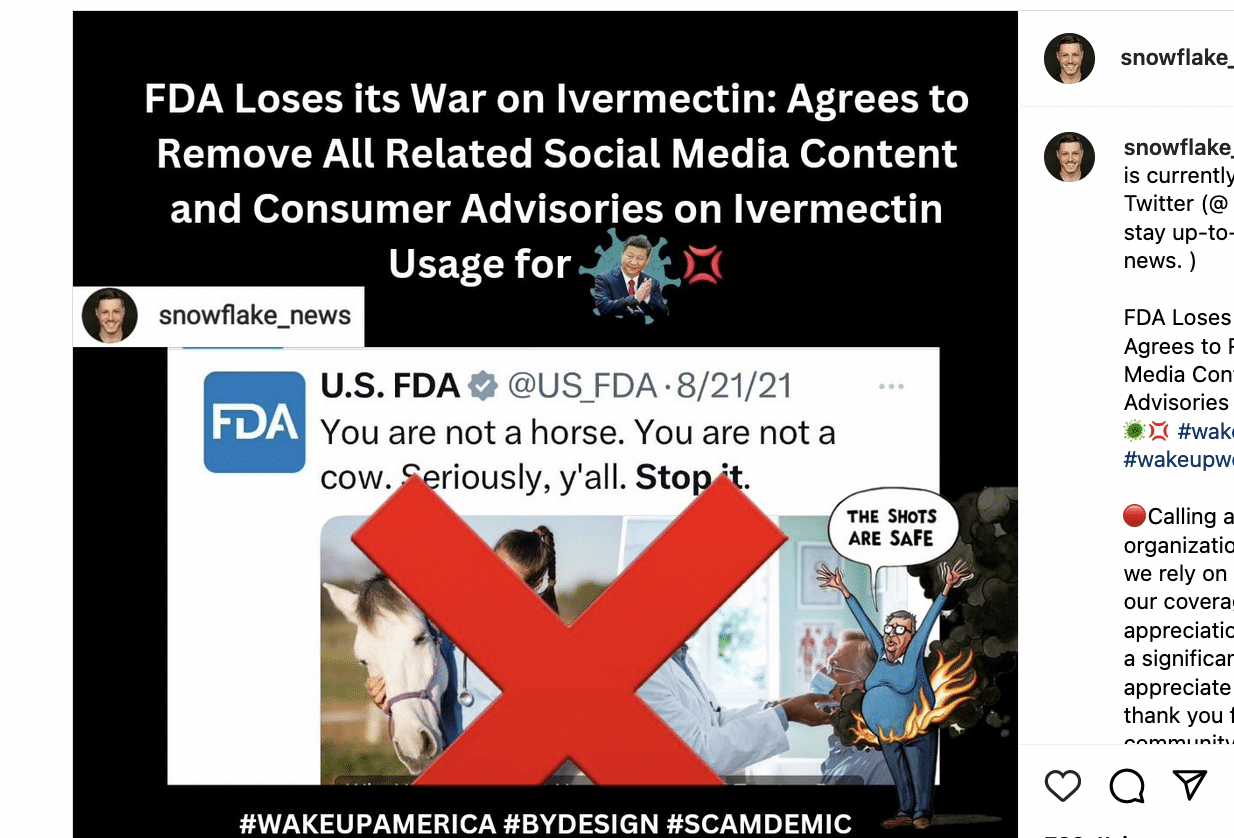- Health
Lack of clinical evidence for claim that N-acetylcysteine is effective against COVID-19 and stops viral replication
Key takeaway
N-acetylcysteine is the precursor to glutathione, an antioxidant that is naturally produced in the body and is involved in detoxification within the liver. It’s approved by the U.S. Food and Drug Administration (FDA) to treat acetaminophen (Tylenol) overdose and excessive mucus production. NAC is of great interest to researchers exploring potential treatments for various medical conditions. But claims portraying NAC as a panacea should be met with skepticism given limited clinical evidence.
Reviewed content

Verdict:
Claim:
N-acetylcysteine inhibits viral replication, breaks up mucus, and is effective against COVID-19
Verdict detail
Inadequate support: While some studies of cells growing in dishes in the laboratory show that NAC can reduce viral replication, this isn’t sufficient evidence in the context of a claim promoting NAC supplements as an aid against COVID-19. Simply because a given effect is observed in the laboratory doesn’t mean the same effect will occur in humans.
Accurate: NAC is approved by the FDA to treat excessive mucus production and to make mucus thinner.
Full Claim
“What does NAC do? It inhibits viral replication and reduces the inflammatory cytokine storm [...] Very simple, very inexpensive, very easy to take”; “It’s great for your lungs, it breaks up mucus, helps you cough that crap out and it stops viral replication”; “According to the FDA, NAC was not widely used as a dietary supplement [...] before its use as a drug. NAC is a supplement. It’s an amino acid. Why do they not want you to take it?”
Review
A Facebook reel posted on 2 September 2023 made several claims about the benefits of taking amino acid supplement N-acetylcysteine (NAC). In the reel, Steve Lucchino, athlete and owner of health supplement shop Elite Nutrition Omaha, claimed that NAC “stops viral replication”, “breaks up mucus”, and is “great for your lungs”. In the background of the video, studies related to COVID-19 were shown. The reel was viewed more than 96,000 times.
Claims that NAC is effective for treating COVID-19 also appeared on TikTok, with some videos drawing tens of thousands of views.
The reel contains a mix of accurate claims and claims that lack context and could be potentially misleading, as we will explain below.
What is NAC?
NAC is the precursor to glutathione, an antioxidant that is naturally produced in the body and is involved in detoxification within the liver. It is also involved in scavenging free radicals, which can otherwise damage cellular components, including DNA. NAC is also known as N-acetyl-L-cysteine.
As a prescription drug, NAC is approved by the U.S. Food and Drug Administration (FDA) to treat acetaminophen (Tylenol) overdose and excessive mucus production.
But NAC can also be found in the form of dietary supplements. NAC is preferred over glutathione as a dietary supplement because oral glutathione isn’t as well-absorbed by the body as NAC.
NAC supplements have been touted as a panacea for many conditions, ranging from aging-related issues to attention-deficit hyperactivity disorder, judging by TikTok videos promoting NAC supplements. However, the clinical evidence to substantiate these claims is still limited[1,2]. For example, important questions, like determining the effective dose for a particular condition and whether the effective dose would be the same across all conditions, have also not been resolved yet.
These glowing endorsements of NAC supplements also tend to leave out important information about the potential drawbacks of NAC. For example, consuming too much NAC can lead to gastrointestinal problems like diarrhea, vomiting, and flatulence.
In a 2019 article for Science Magazine, chemist Derek Lowe highlighted the fact that antioxidants like NAC don’t always only have a beneficial effect on the body. He pointed to a study published in 2014 showing that antioxidants, including NAC, sped up lung cancer progression in mice[3]. Another study published in 2019 showed that chronic NAC treatment promoted lung cancer in aging mice[4]. Overall, these findings suggest some caution should be exercised in taking NAC supplements.
In an article for UCLA Health, Robert Ashley, a specialist in internal medicine and assistant professor, explained that while there’s some evidence of benefit from glutathione supplementation in people with certain medical conditions, healthy people are unlikely to be deficient in glutathione and that “there is no good study for the use of glutathione in healthy people”.
Evidence for NAC’s effect on viral replication came from in vitro studies, not people
To support his claim that NAC stops viral replication and is effective against COVID-19, Lucchino cited a study published in 2020, titled “N-Acetylcysteine to Combat COVID-19: An Evidence Review”. However, the segment of the study shown in the reel clearly indicates that the data on viral replication was obtained in cell cultures—cells growing in dishes in the laboratory—not in humans.
Furthermore, that the researchers considered the ability of NAC to inhibit SARS-CoV-2 replication to be theoretical, but not yet demonstrated:
“In addition, NAC has also been showed[sic] to inhibit replication of other viruses, such as human immunodeficiency virus (HIV)24 and respiratory syncytial virus (RSV).25 This means that, theoretically, NAC has the potential to inhibit SARS-Cov-2 as well because of its ability to negatively regulate NF-κB.” [emphasis added]
Conflicting results on whether NAC effectively treats COVID-19
Given NAC’s effectiveness in thinning out mucus, it could certainly be useful in relieving COVID-19 symptoms related to mucus production.
But whether NAC has any utility against COVID-19 apart from its mucolytic effect is unclear. There are some studies examining the effectiveness of NAC as a COVID-19 treatment in patients. However, these have generated conflicting results.
A randomized controlled clinical trial conducted in Spain on critically ill COVID-19 patients reported improvements in oxygen uptake and reduced levels of biomarkers associated with inflammation. However, these didn’t ultimately translate into improved survival[5].
A retrospective study in Greece that looked at hospitalized patients with moderate or severe COVID-19 pneumonia reported that compared to patients who didn’t receive NAC, NAC-treated patients were less likely to require mechanical ventilation and had lower mortality rates 28 days after hospital admission[6]. Interestingly, there were more patients with severe disease within the NAC-treated group than in the control group. But the authors called for “properly designed prospective clinical trials” to confirm these findings.
On the flip side, a double blind, randomized, placebo-controlled trial in Brazil, which included patients with severe COVID-19, didn’t find that high-dose NAC reduced the need for mechanical ventilation[7]. Nor did it reduce the length of stay in intensive care or mortality.
A retrospective study in Italy found that surviving NAC-treated patients had a shorter hospital stay compared to those who didn’t[8]. But the researchers found no impact on in-hospital mortality and ICU admission between the two groups.
Therefore, more studies—preferably randomized controlled clinical trials—are still required before we can make sound conclusions about the effectiveness of NAC against COVID-19. At the time of publication, a search in ClinicalTrials.gov shows three clinical trials that are active.
It’s also important to consider that the studies cited above dealt solely with hospitalized COVID-19 patients who were seriously ill. It’s possible that NAC may produce different results in people who are only mildly ill. A clinical trial conducted by the Cambridge Health Alliance in the U.S. could help answer this question. It looked at whether NAC can reduce the likelihood of mild COVID-19 progressing to severe disease. The trial is currently listed as “Completed” in ClinicalTrials.gov, but the results haven’t yet been published.
Health Feedback reached out to Lucchino via the Contact page of Elite Nutrition Omaha’s website, but didn’t receive a response by the time of publication.
FDA didn’t ban NAC as a dietary supplement; NAC supplement guidance isn’t legally binding
Claims that the FDA was banning NAC as a supplement—also implied by Lucchino who claimed “they” don’t want people taking NAC—originated from the FDA’s response to citizen petitioners asking that NAC not be excluded in the dietary supplement definition.
Under the Federal Food, Drug, and Cosmetic Act, a product that was approved as a new drug cannot be considered a dietary supplement unless the product was marketed as a dietary supplement or food before the approval or the FDA issues a regulation finding the product to be lawful under the Federal Food, Drug, and Cosmetic Act.
Because NAC was approved as a drug before it began to be marketed, the Act doesn’t allow it to be considered a dietary supplement.
The FDA issued its final guidance in 2022 on NAC-containing products. The guidance expressed the FDA’s “intent to exercise enforcement discretion with respect to the sale and distribution of certain NAC-containing products that are labeled as dietary supplements”:
“This enforcement discretion policy applies to products that would be lawfully marketed dietary supplements if NAC were not excluded from the definition of ‘dietary supplement’ and are not otherwise in violation of the Federal Food, Drug, and Cosmetic Act (FD&C Act)”.
The enforcement discretion policy means that, even though NAC is excluded from the dietary supplement definition, the FDA wouldn’t enforce on NAC-containing dietary supplement products, so long as the products don’t otherwise violate the Federal Food, Drug, and Cosmetic Act.
In addition, the FDA’s final guidance isn’t legally binding. The FDA website stated:
“The contents of this document do not have the force and effect of law and are not meant to bind the public in any way, unless specifically incorporated into a contract. This document is intended only to provide clarity to the public regarding existing requirements under the law. FDA guidance documents, including this guidance, should be viewed only as recommendations, unless specific regulatory or statutory requirements are cited. The use of the word should in FDA guidances means that something is suggested or recommended, but not required.” [emphasis added]
Moreover, the FDA’s guidance added that the “FDA’s full safety review of NAC remains ongoing”, but that the “initial review has not revealed safety concerns with respect to the use of this ingredient in or as a dietary supplement”. Therefore, the FDA was “considering initiating rulemaking under section 201(ff)(3)(B) of the FD&C Act to permit the use of NAC in or as a dietary supplement”.
Health Feedback reached out to the FDA for comment and will update this review if new information becomes available.
Overall, claims that the FDA wants to ban NAC as a dietary supplement don’t accurately reflect the stance that the FDA took.
Conclusion
In summary, it’s correct that NAC is effective against mucus production, and using NAC to tackle mucus-related COVID-19 symptoms can indeed be helpful. But beyond NAC’s mucolytic effect, it’s unclear whether NAC has any other benefit for COVID-19 patients. While NAC has been shown to reduce viral replication, this was observed in in vitro studies and for other viruses, not in humans and not in SARS-CoV-2. Whether these in vitro results can be replicated in humans remains to be seen.
Moreover, there’s a gap between observing promising in vitro results from a drug and actually seeing the drug produce clinically significant improvements in people. It remains unclear whether taking NAC would be effective against COVID-19 and if so, whether the severity of disease has an impact on NAC’s effectiveness. Additional studies are needed before we can reliably draw conclusions about the utility of NAC against COVID-19.
REFERENCES
- 1 – Smaga et al. (2021) N-acetylcysteine as a new prominent approach for treating psychiatric disorders. British Journal of Pharmacology.
- 2 – Dos Santos Tenório et al. (2021) N-Acetylcysteine (NAC): Impacts on Human Health. Antioxidants.
- 3 – Sayin et al. (2014) Antioxidants Accelerate Lung Cancer Progression in Mice. Science Translational Medicine.
- 4 – Breau et al. (2019) The antioxidant N-acetylcysteine protects from lung emphysema but induces lung adenocarcinoma in mice. JCI Insight.
- 5 – Gamarra-Morales et al. (2023) Response to Intravenous N-Acetylcysteine Supplementation in Critically Ill Patients with COVID-19. Nutrients.
- 6 – Assimakopoulos et al. (2021) N-acetyl-cysteine reduces the risk for mechanical ventilation and mortality in patients with COVID-19 pneumonia: a two-center retrospective cohort study. Infectious Diseases.
- 7 – De Alencar et al. (2021) Double-blind, Randomized, Placebo-controlled Trial With N-acetylcysteine for Treatment of Severe Acute Respiratory Syndrome Caused by Coronavirus Disease 2019 (COVID-19). Clinical Infectious Diseases.
- 8 – Faverio et al. (2022) Impact of N-acetyl-l-cysteine on SARS-CoV-2 pneumonia and its sequelae: results from a large cohort study. ERJ Open Research.



